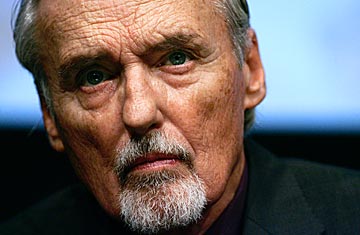
Hopper in 2008
(2 of 2)
What choice did they have but give the chief lunatic the keys to the asylum? So one of the most venerable studios, Universal, wrote Hopper a blank check to make The Last Movie. He hooked up with Stewart Stern, who had written Rebel, and concocted the frail story of a movie extra who stays on a Western location after the circus has left town. Honorably hallucinogenic and epochally weird, as colorful and intelligible as a peyote dream, The Last Movie was a notorious flop; its title might have predicted the end of Hopper's tenure in the director's chair.
Yet he was back behind the camera in 1980, with Out of the Blue, in which he also played an ex-con alcoholic with a lonely, adoring daughter; just guess how awful things get. Colors, in 1988, was more traditional but no less gnarly, giving Sean Penn and Robert Duvall extensive scenery-chewing opportunities as two L.A. cops on a gang detail. Hopper was always trying to amp up the moviegoer's discomfort, and succeeded again with The Hot Spot, an erotic, sunbaked noir with Don Johnson, Virginia Madsen and the blossoming young Jennifer Connelly. In the 1994 Chasers he managed a kind of supergroup collision of Hollywood's most eccentric actors; his scenes with Crispin Glover and Gary Busey could be a Stanislavski course in How to Go Too Far, And Then Some.
He matured as an artist — the kind whose work gets shown in galleries — and published several books of his photographs. On July 11 Hopper will be the subject of art dealer Jeffrey Deitch's first exhibition as the new director of the Los Angeles Museum of Contemporary Art; the show will be curated by artist and filmmaker Julian Schnabel. Hopper also had a connoisseur's eye for emerging artists; his collection included prime works by Warhol, Rauschenberg. Ruscha, Stella, and Johns, most of which he had to surrender in various divorce settlements.
But the money still came from acting. Two 1986 movies showed his eerie range. In David Lynch's divinely lunatic Blue Velvet, Hopper was the gas-snorting hood Frank Booth, wailing for his mommy while he rapes Rossellini and scares the crap out of all-American boy Kyle MacLachlan. ("I'll have to send you a love letter! Straight from my heart, f---er! You know what a love letter is? It's a bullet from a f---ing gun, f---er! You receive a love letter from me, and you're f---ed forever!") A few months later he sympathetic and softly nuanced in the inspirational sports film Hoosiers. Hollywood, which loves nothing more than to see a reformed drunk play a reformable one, gave Hopper another Oscar nomination.
As he also reformed into political conservatism, and did commercials teasing his renegade days, he kept playing villains: the maniac who wires Keanu Reeves's and Sandra Bullock's bus in Speed, Kevin Costner's outlaw antagonist on jet skis in the megaflop Waterworld. Casting directors knew he was the apt inhabiter of characters who'd done and seen everything. On encountering the monster Leatherface and his gang in the 1986 The Texas Chainsaw Massacre 2 (Hopper's choice for his worst movie ever), he soothingly mutters, "Boys, boys, boys..."
By the end he was back in TV, doing extended stints on 24 and in the series version of the Oscar-winning film Crash. Henry Hathaway would have been proud of the way the stubborn young actor became a model senior citizen of the craft. And Hopper must have been more than a little surprised. "I should have been dead ten times over," he said. "It's an absolute miracle that I'm still around."
At the March 26th dedication of Hopper's star on the Hollywood Walk of Fame, his fellow actor and painter Viggo Mortensen said much the same thing: "He is someone who has seemed to regularly rise out of the ashes of self-inflicted chaos, surprising us with his originality and wit as an artist and defying the odds by somehow staying alive physically and professionally." Nicholson and Lynch were there, and Hopper too. Frail from cancer treatments and heavily bandaged from a recent fall, he was helped to the stage by assistants and struggled as he thanked all those who "have enriched my life tremendously. They've shown me a world that I'd never seen, being a farm boy from Dodge City, Kansas."
That kid carried a lot of baggage with him, but with the help of untold angels and demons he took many an amazing trip. And now, after a lifetime of detours from death, the Easy Rider's gone.
